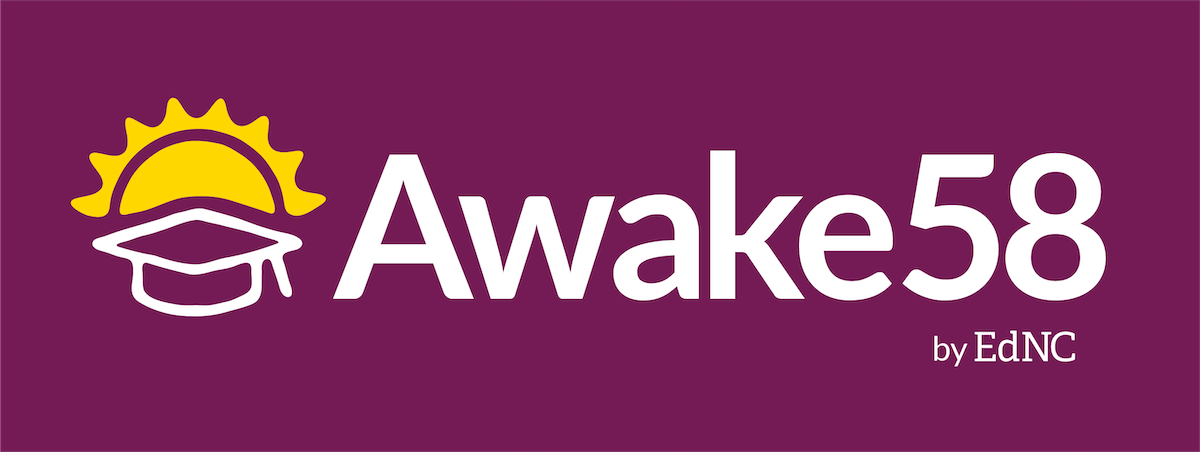A note from us
Hello and welcome to the latest edition of Awake58 — Hannah here. If you missed last week’s Awake58 about First Lady Dr. Jill Biden’s visit to North Carolina, you can find it on our website.
Higher education leaders in North Carolina are working to spread the word about the Next NC scholarship… Gov. Roy Cooper released his budget proposal last week, including provisions for community colleges… Highlighting a business apprenticeship at Blue Ridge Community College… Plus, a recap from the Advisory Council on Hispanic/Latino Affairs Education Subcommittee’s visit to Greene County Schools and Lenoir Community College…
This year’s short session kicked off last Wednesday. During this session, lawmakers can adjust the two-year budget passed in the long session and are able to discuss bills that previously passed one house (known as making crossover) or recommendations from a study commission.
North Carolina has a projected one-time $1.4 billion surplus in state revenues through Fiscal Year (FY) 2025, according to the latest consensus revenue forecast. This essentially means there is $1.4 billion extra state dollars that lawmakers can choose to invest this short session. There is a Republican supermajority this session, meaning Republicans will drive fiscal and policy decisions.
The N.C. Community College System’s (NCCCS) legislative request includes a nearly $100 million request to implement Propel NC, the system’s funding model proposal. Stay tuned for EdNC’s short session preview for the specifics of that request. In the meantime, you can check out EdNC’s K-12 short session preview on our website. Some of those policy items will likely impact the postsecondary space too, including a three-year graduation track for high schoolers, career development initiatives, and discussions about equity.
Shortly before the short session kicked off, Democratic Gov. Roy Cooper released his budget proposal. Among other things, his budget included a 5% raise and bonus for most community college employees and some funding toward Propel NC.
“We recognize (community colleges) as a core anchor to economic improvement,” Cooper said.
What questions do you have about the short session or budget process? What would you like to see the updated budget include? Let us know by emailing me at [email protected].
We’ll see you on the road,
Hannah Vinueza McClellan
EdNC’s Senior Reporter
EdNC reads
Next NC Scholarship works to remove financial obstacles for college students
Though finances can be a hurdle for students seeking higher education, a new scholarship in North Carolina may completely remove that obstacle for many.
The Next NC Scholarship combines state funds and the Federal Pell Grant to offer free community college tuition for North Carolina students with an adjusted gross income (AGI) of $80,000 or less. The scholarship also covers at least half of UNC System tuition.
“The Next NC Scholarship really is a fantastic tool to give so many of our students the opportunity to attend college for free or heavily discounted,” said Benjamin Rickert, director of marketing and communications for Blue Ridge Community College (BRCC). “As educators, partners in our state’s workforce development engine, our hope is that the Next NC Scholarship is going to encourage more of our students to pursue postsecondary education and gain jobs in those high demand and high wage workforce areas that our state needs.”
Qualifying students enrolling in any of the state’s 58 community colleges can receive at least $3,000 for tuition and fees, and students enrolling in any of the state’s 16 public universities will receive at least $5,000 for tuition and fees.
You can read more about the scholarship, and local efforts to promote it, on our website.
Governor’s budget proposes 5% raise for community college employees, some funds for Propel NC
Gov. Cooper presented his $34.5 billion budget proposal for Fiscal Year (FY) 2024-25 last Wednesday, calling for approximately an additional $1 billion to go toward public education — including an average 8.5% raise for teachers, a $1,500 retention bonus, and reinstatement of master’s pay.
His proposal includes a 5% raise for most state employees, which includes non-certified school employees and most community college employees.
State-funded community college employees would receive the same retention bonus as state employees and educators, up to $1,500. Community college retirees would also receive the same one-time 3% supplement.
On top of the retention bonus, Cooper’s proposal includes $3.1 million to give “a 10% per course bonus for full-time and adjunct instructors who teach courses inside correctional facilities.”
“Community colleges play a key role in education for incarcerated individuals. Obtaining an associate’s degree significantly reduces recidivism rates,” the proposal says. “Currently, over 75 community college courses are offered in prisons across the state.”
Cooper’s proposal also includes $34.3 million to implement Propel NC.
“This new funding model will help streamline degree attainment and prepare a well-trained workforce to meet the demands of the State’s growing economy,” the proposal says.
Read more about his proposal on our website.
Earn while you learn apprenticeship programs increase access to jobs in banking and finance
Alli Lindenberg published an inspiring feature last week about a first-generation student in an apprenticeship program at Blue Ridge Community College.
Lupita Montiel is on her way to becoming the first in her family to graduate from college. The youngest of her siblings, it has been a dream of hers to go further in higher education. Thanks to an apprenticeship program through Blue Ridge Community College, she’s one step closer to achieving that dream.
“I want to get my degree. None of my siblings have a degree — they’re working,” Montiel said. “They tried, but it just wasn’t for them… and I understood that.”
After three semesters of working and studying, she earned a certificate in business from Blue Ridge Community College. The sense of accomplishment and pride gained from earning her certificate had an impact on more than just Montiel. At the ceremony where she received her certificate, family and friends filled the room.
“We know how big this was for her and her family,” said Shanda Bedoian, the director of corporate and customized training at Blue Ridge Community College. “… She probably had 20-30 people there. It was everybody. Family, friends, you name it.”
Apprenticeships provide students with the ability to earn wages while working toward a credential, certificate, or college degree. For many college students, especially first-generation college students, working while attending school is a necessity. It is estimated that about 50% of first-generation college students are low income, according to the Center for First-Generation Student Success. In addition, 66% of first-generation students were employed while in school.
Read Alli’s full piece at EdNC.org.
State Hispanic/Latino education leaders visit a ‘world community’ in eastern North Carolina
Gov. Roy Cooper’s Advisory Council on Hispanic/Latino Affairs Education Subcommittee visited Greene County Schools and Lenoir Community College on April 18, 2024 to learn more about the schools’ efforts to engage the Hispanic/Latino population in their communities. These visits are part of a series the subcommittee has taken to see the challenges and opportunities Hispanic/Latino students are facing across the state.
“We just want to learn,” said Prudencio Martinez-Mengel, director of Latino outreach and recruitment at Lenoir Community College and member of the subcommittee. “Instead of just sitting in Raleigh waiting for people to come, we just decided to go on the road and learn about the communities, get to know them, and let them know that we exist, because unfortunately, there’s a disconnection about Latino resources in the state and locally.”
The Hispanic/Latino community in North Carolina has seen significant growth in the past decade, with an estimated growth rate of 40% between 2010 and 2020. According to the 2020 Census, the Hispanic/Latino population makes up 10.7% of North Carolina’s population, which translates to more than 1.1 million people.
In addition to the statewide growth of the Hispanic/Latino community, the student population has increased as well. Today, Greene County School’s Hispanic/Latino student population makes up 35.4% of the total student population compared to 31.7% in the 2018-19 school year.
At the postsecondary level, Lenoir Community College has a Hispanic/Latino population of 17% in fall 2023 compared to 12% in fall 2018.
Read Alli’s full article on our website.
Around NC
NASA visits public schools | Astronaut Christina Koch visited North Carolina A&T State University on April 23 to discuss her career and join Gov. Roy Cooper as he continues to advocate for public schools and STEM education. EdNC’s Laura Browne has the scoop from the visit. Koch, who grew up in Jacksonville attending North Carolina public schools, served on the International Space Station and broke the record for spending the longest continuous time in space for a woman. She also took part in the first all-female space walk. She will participate in the Artemis II mission, expected in 2025.
New AI program | Central Piedmont Community College will open a new associate degree program in artificial intelligence (AI) technology in fall 2024. Central Piedmont is only the second North Carolina community college to offer an artificial intelligence degree program, according to a release from the college.
Johnston CC to expand cybersecurity program | Johnston Community College was recently awarded $645,836 from the National Science Foundation (NSF) to establish a simulated cyber range training environment. This initiative aims to bolster the college’s cybersecurity program, providing students with hands-on experience crucial for success in the rapidly evolving field of cyber technology.
Rising college budgets | Haywood Community College is asking for a 7.5% increase in operations funding in Haywood county’s new budget, WLOS reported. The college is asking for more funding to continue retraining former mill workers and because of an increase in the projected cost of multiple projects.
Accreditation warning updates | In December 2023, Cape Fear Community College was put on warning by the Southern Association of Colleges and Schools (SACS), WHQR reported last week. From the article: “Email and personnel records show that this warning followed the removal of key employees who worked on SACS compliance — and concerns that top administrators were asking for fabricated information to help complete a key report for SACS. The college denies these allegations.”
Truck driver graduates | Wayne Community College graduated its next class of truck drivers, which included 18 students. Graduates earned a Class A Commercial Driver’s License, DOT 380 certificate, and workforce continuing education certificate. This is the college’s second class of graduates from the program’s daytime course and the 13th class for the evening course.
Miss America’s Teen is a dual enrollment student | The 2024 Miss America’s Teen, Hanley House, is dually enrolled as a junior at Cleveland High School in Johnston County and taking college courses through Wake Technical Community College. Read more of the young entrepreneur’s story on Spectrum New’s website.
Other higher education reads
Sign up for Awake58, our newsletter on all things community college.

